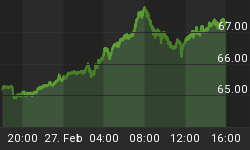Although the Dollar recently made new lows against most major currencies, the Chinese Government has maintained a tight peg on the Yuan/Dollar ratio since July of 2008. However, the Yuan is likely to appreciate in the near future because China's trade surplus continues to increase. Though often overlooked, one way to capitalize on the eventual re-appreciation of the Yuan is to invest in stocks of Chinese companies, especially those with significant cash balances relative to their market capitalizations. A number of these companies can be found on the Singapore Stock Exchange and are known as the S-Chips.
The Yuan, from 1997 through 2005, was held steady by China's central bank at an exchange rate of 8.28 against the Dollar. In 2005, the currency was revalued higher and then steadily increased through July 2008. When the global economy started to turn down in 2008, China held the Dollar exchange rate in a tight band near 6.82.
Figure 1. USD/Chinese Yuan Exchange Rate
Despite facing a recession that has lasted several quarters, the US has continued to run trade deficits with China. As a result, China's Dollar reserves have continued to grow. In recent months the Central Bank has made it clear that these new Dollars are no longer being held by the Central Bank but instead are used to buy other currencies and commodities like copper, gold and oil. The strategy of diversifying Dollars into both currencies and commodities is sustainable as long as China acts without driving prices too high. However, at some point prices will rise so high that China will be forced to allow the Yuan to appreciate against the Dollar. With oil above $80 and copper testing $3.00, it should be no surprise that the four-year currency forward market (Figure 2) is pricing in the expectation of a Yuan revaluation.
Figure 2. USD/Chinese Yuan Forward Curve
Source: Bloomberg
Investing in profitable Chinese companies is a good way to benefit from an appreciating Yuan as these companies "manufacture" new Yuan each year for shareholders. Unfortunately, a lot of Chinese equities are priced to account for very high growth and are therefore expensive relative to their earnings and book values. However, the S-Chips tend to have large net-cash (cash less interest bearing debt) balances relative to their market capitalization. The cash balances, for a US investor, will be revalued higher if the Yuan increases relative to the Dollar. Figure 3 is a Bloomberg screen of cash as a percentage of market capitalization for the S-chips. Although nearly all of the stocks appear inexpensive, investors should do their own due diligence before investing.
Figure 3: S-Chips With Net-Cash Greater Than 35% of Market Capitalization
Source: Bloomberg
Although there are concerns that China's exports will suffer if the Yuan increases in value, it is only a matter of time until China allows the Yuan to re-appreciate. The forward market supports this view. Buying Chinese equities, especially those with large cash balances as a percentage of market capitalization, is a great way to participate in the inevitable rise of the Yuan.















